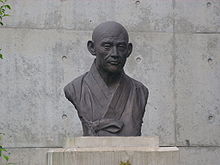- Han Yong-un
-
Han Yong-un 
Korean name Hangul 한용운 Hanja 韓龍雲 Revised Romanization Han Yong-un McCune–Reischauer Han Yongun Pen name Hangul 만해 Hanja 萬海 also 卍海 Revised Romanization Manhae McCune–Reischauer Manhae Birth name Hangul 한유천 Hanja 韓裕天 Revised Romanization Han Yu-cheon McCune–Reischauer Han Yuch'ŏn Courtesy name Hangul 정옥 Hanja 貞玉 Revised Romanization Jeongok McCune–Reischauer Chŏngok Dharma name Hangul 한봉완 Hanja 奉玩 Revised Romanization Bongwan McCune–Reischauer Pongwan Manhae (August 29, 1879 – June 29, 1944) was a twentieth century Korean Buddhist reformer and poet. Manhae was his pen name; his birth name was Han Yu-cheon, but he is universally known by the name he was given by his meditation instructor in 1907, Han Yong-un (Korean: 한용운 or; also written Han Yong-woon)
Manhae was born in northern Gyeongsang province in what is today South Korea. Prior to being ordained, he was involved in resistance to Japanese influence in the country, which culminated in the Japanese occupation from 1905 to 1945. The same year the occupation began, 1905, Manhae was ordained as a Buddhist monk at Baekdam Temple on Mt. Seorak.
As a social writer, Manhae called for the reform of Korean Buddhism.
Manhae's poetry dealt with both nationalism and sexual love. One of his more political collections was Nimui Chimmuk (님의 침묵), published in 1926. These works revolve around the ideas of equality and freedom, and helped inspire the tendencies toward passive resistance and non-violence in the Korean independence movement.
External links
- An article discussing Manhae and Baekdam Temple
Buddhism Categories:- 1879 births
- 1944 deaths
- Korean independence activists
- Korean Buddhism writers
- Korean poets
- Literature of Korea under Japanese rule
- Buddhist writers
- Korean Buddhist monks
- Korean philosophers
Wikimedia Foundation. 2010.
